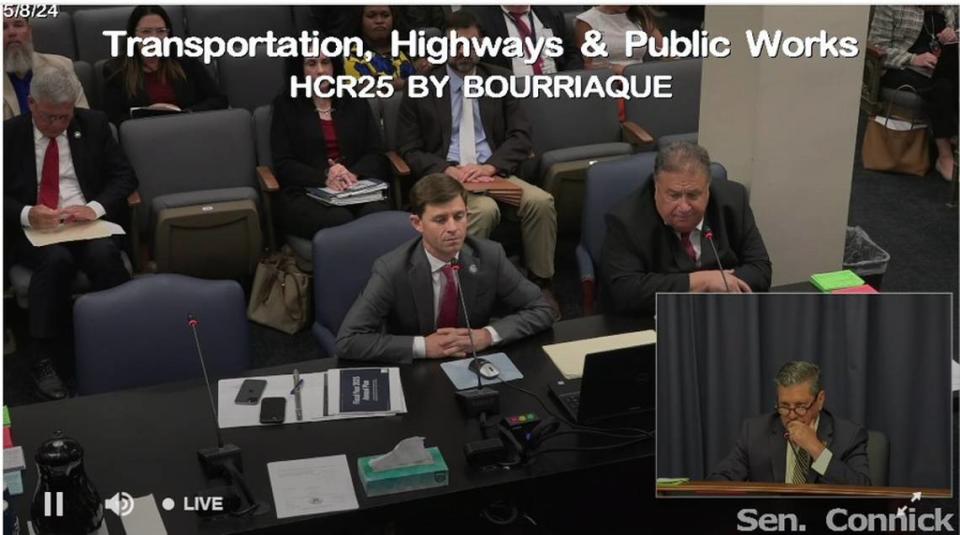Louisiana could lose nearly $1 billion if controversial coastal project is canceled
Louisiana could be on the hook for close to $1 billion if it allows the proposed Mid-Barataria Sediment Diversion project to die, state officials say, as the massive coastal restoration effort faces legal and political challenges.
State officials also signaled the possibility of changing the scope of the unprecedented project even though construction began last August after years of planning and scientific evaluation.
Facing tough questions at a Senate committee hearing on Wednesday, Coastal Protection and Restoration Authority leaders said that the state could be facing between $250 million and $500 million in damages owed subcontractors if it cancels contracts to build the diversion. Separately, CPRA officials have confirmed that the agency has already spent $422.23 million on construction, mitigation and pre-construction costs.
Another $463 million for the project is included in the coastal agency’s annual budget for the 2025 fiscal year, which the Senate Transportation, Highways and Public Works Committee was reviewing during Wednesday’s hearing.
“That’s a billion dollars, or $700 million, or whatever, right there, without the economic benefit of the project happening,” said state Sen. Gary Carter Jr., D-Algiers.
The diversion, at a total cost of $2.92 billion, is being paid for with fines and settlement money related to the 2010 BP oil spill. The unprecedented project has been hailed by coastal advocates and scientists as a vital step in helping limit Louisiana’s land loss crisis, and one that works with nature by allowing the forces of the river to rebuild lost wetlands.
South Mississippi paying attention
But commercial fishers and Plaquemines Parish are strongly opposed due to the influx of fresh water it will bring from the Mississippi River into the Barataria Basin. The influx of river water will severely affect oyster and shrimp populations in that area. Its initial operation also is expected to result in the deaths of about 2,000 bottlenose dolphins that have moved farther into the basin as salinity has increased there due to land loss.
South Mississippians are closely watching developments because CPRA plans a second project on the river’s east side near Belle Chase, Louisiana, called the mid-Breton Sediment Diversion. While CPRA says the diversion will not infiltrate the Mississippi Sound, commercial fishermen in Mississippi are skeptical. They also fish Louisiana waters, which will be impacted.
Gov. John Bel Edwards was a strong supporter of the project, but Gov. Jeff Landry’s administration has sent mixed signals since taking office in January.
Construction has been halted by stop-work orders issued by Plaquemines Parish after a protracted court battle stretching back to November. The parish has filed suit in Plaquemines’ 25th Judicial District Court over the lack of parish permits.
The state last year filed its own suit in the 19th Judicial District Court in Baton Rouge, arguing that it was building the diversion under its “police power,” which is not subject to parish rules or ordinances. It cited a 2003 state Supreme Court decision upholding the state’s authority to operate the Caernarvon freshwater diversion, also in Plaquemines Parish, as a coastal restoration project.

The Legislature, in creating the CPRA, also tasked it with sole authority over coastal protection projects, the state argued then.
That ruling was overturned by two state appeals courts, which ordered the case returned to the Plaquemines court earlier this year.
At that point, the parish again issued a stop-work order for the project, which the state has agreed to comply with.
‘It’s your parish’
On Wednesday, CPRA Chairman Gordy Dove strayed from the state’s earlier legal argument by saying that the parish has the right to issue its own permits. He also signaled the state may be negotiating with the parish on changing the scope of the project. He and CPRA Executive Director Glenn Ledet added that the state contractor has filed paperwork necessary to request parish permits.
“I don’t believe that’s the place of CPRA to make that decision, whether or not a permit is needed,” Dove said.
Asked if the CPRA and Landry will appeal the parish court ruling upholding the stop-work order, Dove said: “We’re not taking a position because right now we’ve been going back and forth with Plaquemines Parish to see what they’re looking at.”
“As far as I’m concerned, it’s your parish,” he said, addressing Carter and Public Works Committee Chairman Patrick Connick, R-Marrero, who both represent portions of the Barataria Basin and Plaquemines Parish.
“We’re looking at what projects and what scope of projects can they live with and not with, and meanwhile we’re waiting to go to court. We’re trying to look for a solution with the local government and all parties involved.”
Dove also hinted that the state may attempt to blame the project contractor for not applying for the parish permits if the project fails and subcontractors request damages.
The project is being built under a “construction manager at risk” program, which requires senior contracting firms to deliver it within a guaranteed maximum price. The lead construction manager firms are St. Louis-based Alberici and Atlanta-based Archer Western, a subsidiary of Walsh Construction. There are 16 subcontractor firms involved.
Neither Alberici nor Archer Western have responded to requests for information about their financial risks if the project is canceled.
The diversion, which is designed to restore as much as 21 square miles of open water to wetlands over 50 years, will funnel freshwater and sediment from the river to the basin near Ironton.
Carter asked whether the agencies responsible for distributing the BP spill money would request repayment if the state cancels the project, but did not receive an answer. Also unclear is whether those agencies would provide the state with additional money to pay for damages resulting from the project’s cancellation.


